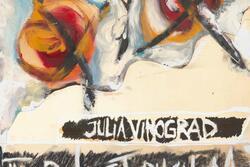JAP? Nah, I'm a JAF.
Nearly every Jewish woman is familiar with the stereotype of the Jewish American Princess (JAP). You probably went to camp or high school or college with that girl, you know, the one who got a nose job the summer before eleventh grade, or the one who talked loudly about her tour of Europe over winter break. Even if you’re not really the jappy type, whenever you acted remotely bratty or spoiled, there it was: someone telling you to stop acting like a JAP.
In my conversations with friends about the term, some have proposed reclaiming JAP; others feel that it has already been reclaimed. Although I do think that turning a negative term into a positive one can be effective for the community that it impacts, doing so with JAP makes me uncomfortable. I read Ms. magazine cofounder Letty Cottin Pogrebin’s semi-autobiographical work Deborah, Golda, and Me early on in my high school career, and was very influenced by her in-depth discussion of the anti-Semitic and sexist overtones and ramifications that the term JAP possesses. In Deborah, Golda, and Me, Pogrebin encourages young Jewish women to shed the stereotype of JAP and adopt JAF: the Jewish American Feminist.
This suggestion really impacted me, to the point that I nearly named my blog The JAF Blog. The idea of subverting this all-too-familiar slur really appeals to me, more than reclaiming JAP does. JAF takes ownership of JAP and reminds us of the history of anti-Jewish prejudice and discrimination that it represents while simultaneously putting a positive spin on the oft-rejected word feminist. Instead of describing a girl or woman who is shallow and obsessed with keeping up with the Steins, JAF celebrates the struggle for empowerment and creates a community based off of the values of social justice, equal rights, and inclusion.
Putting aside the fact that the JAP stereotype does not characterize most of the Jewish girls and women I know, it is important that we, as Jewish women, heed Pogrebin’s call and begin to identify as JAFs rather than JAPs. To perpetuate the JAP stereotype within the community it victimizes is unwise at best and disproportionately detrimental at worst. Instead of internalizing the discrimination that has been leveled at us, we should be challenging it whenever we see it. To me, that is completely encapsulated within and accomplished by the term JAF.
At the 2013 JOFA conference panel “‘Slut!: The Shame Effect,” the feminist author and slut-shaming expert Leora Tanenbaum said, “I fervently hope for the day when we can all use slut as a feminist punch line that exposes the absurdity of the double standard, but we’re not there yet.” I feel the same way about the word JAP. One day, Western society will get to the point where the misogyny and anti-Semitism that it carries are no longer relevant. Until then, I’d rather subvert the term or avoid it altogether. It’s much more fun to smash the patriarchy than perpetuate it.







sadly some jewish women do fit the jap stereotype but it is totally overgeneralized. a feminist response is exactly the right antidote to this cartoonish anti-Semitism and I encourage jewish and gentile women every where to support and emulate jaf.